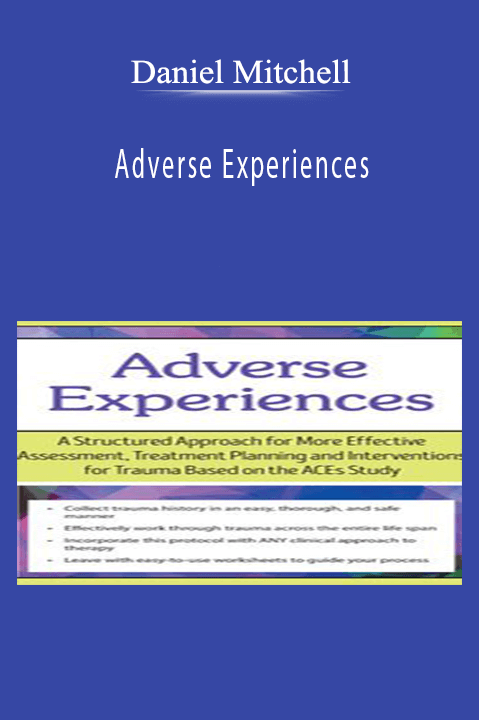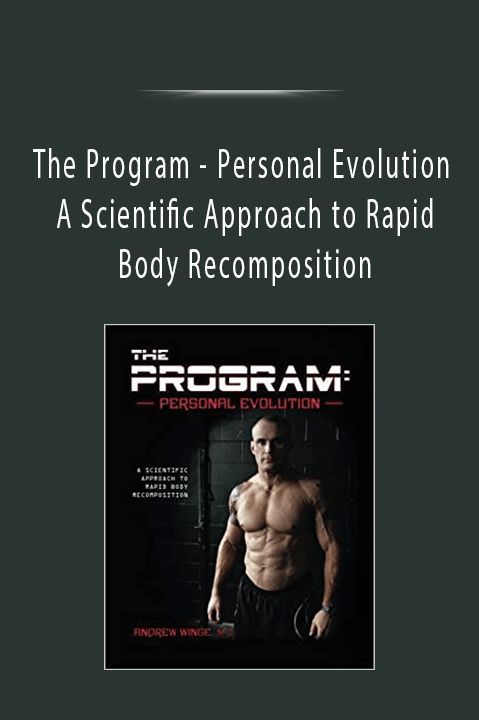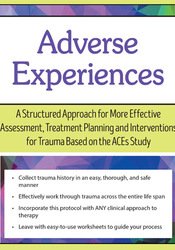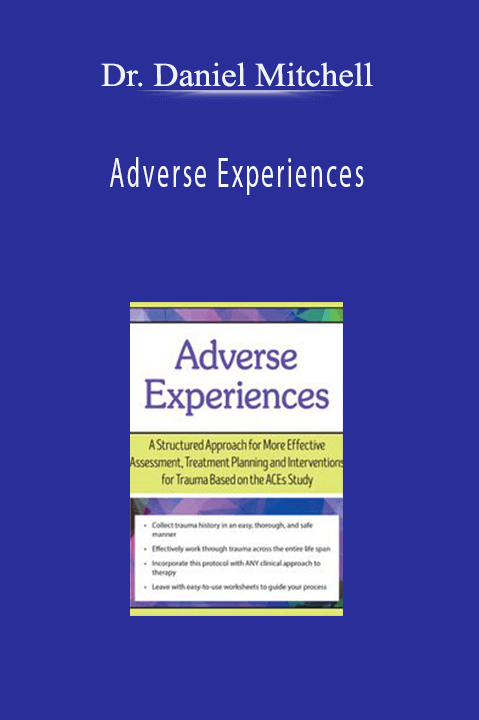Adverse Experiences: A Structured Approach for More Effective Assessment, Treatment Planning and Interventions for Trauma Based on the ACEs Study – Daniel Mitchell
I once worked with a client who was diagnosed with panic disorder after experiencing a horrific car accident. Utilizing traditional talk therapy over the course of nine months, it became clear that her symptoms were not improving; in fact, they were getting worse.
She was no longer working, avoided driving or riding in cars, had gained weight, developed chronic pain and suffered from insomnia – all while in treatment where she was supposed to be getting better! I was at a loss as to where to go with therapy.
Then (at last!) there was a breakthrough! It didn’t happen by accident – I had discovered a new approach for assessment based on the Adverse Childhood Experiences (ACEs) study and implemented it with this client. Together we uncovered a long history of traumatic experiences that were the foundation of her symptoms – not only the car accident.
Based on this, we charted a very specific course of treatment and, within just 8 sessions, her symptoms had dramatically improved. She was back to work, driving with minimal distress, was panic-free, sleeping adequately and had begun exercising! Success!
Watch this highly experiential training to learn this strengths-based approach that is grounded in multiple empirically-based disciplines, including EMDR, CBT, MBSR and positive psychology.
Integrate this approach to more effectively treat:
- PTSD
- Depression
- Anxiety
- Phobias
- Substance abuse
- Eating disorders
- Somatization disorders
- Chronic pain
- General illness
- & many other clinical issues
You don’t want to miss out!
~Daniel Mitchell, Ph.D.
- Incorporate ACEs into your intake to allow for a more effective trauma associated with your clients.
- Determine how adverse experiences, including ACEs, impact human development and how traumatic material can create developmental gaps in emotional development in your clients.
- Incorporate the easy-to-use timeline method of assessment and treatment planning to better understand your clients’ history and how you can more effectively treat them.
- Model how to gather important information about your client that will help to build upon their positive traits and experiences; then help them link these experiences to core beliefs that are more adaptive for success in treatment.
- Integrate mindfulness skills, relational and communication skills, imagery, and grounding skills to help your clients reduce the intensity of the memory of their traumatic disturbance.
- Determine how to help your clients take the adaptive foundation they have uncovered and use that to transform how they cope with disturbing or adverse experiences.
- Integrate this assessment approach with several different therapy modalities to effectively help your clients in fewer sessions.
Get Adverse Experiences: A Structured Approach for More Effective Assessment, Treatment Planning and Interventions for Trauma Based on the ACEs Study of author Daniel Mitchell
The Impact of Adverse Experiences on Development
- Adverse Childhood Experiences (ACEs) study correlation with mental illness and chronic pain
- Traumatic material can create developmental gaps
- Adverse experiences and trauma
A Timeline Approach for Better Assessment
- Uncover adverse experiences not identified in standard assessment
- Adaptive Experiences – Strengths and positive moments
- Maladaptive Experiences – Adverse and traumatic material
- Distinguish and separate memories that have BOTH positive and negative aspects
Breaking Down Memories and Experiences To Help Clients Heal
- Distinguishing images, body sensations, emotions and thoughts
- Identify dominate core beliefs using my concept of “cognitive buckets”
- Reshape their core beliefs in more adaptive ways
Effective Coping Resources for Clients
- Easily track intensity of distress from moment to moment
- Quick, easy and effective coping strategies
- Tie in coping skills to behavioral rehearsal
Facilitate Breakthroughs with Challenging Cases
- Overcome cognitive barriers that might inadvertently keep patients “stuck in therapy”
- Work through secondary gain issues
- Help patients become ready for new therapies
Integrate this Approach with Other Treatment Modalities
- How to effectively incorporate with:
- CBT
- CPT
- EMDR
- Narrative Therapy
- Play Therapy
- Art Therapy
- Solution-Focused Therapy
- Person-Centered Therapy
- ACT
Get Instant Access Adverse Experiences: A Structured Approach for More Effective Assessment, Treatment Planning and Interventions for Trauma Based on the ACEs Study – Daniel Mitchell at Offimc.click Now!
Sale page_https://catalog.pesi.com/item/32797/
Archive: https://archive.fo/zVd84
Delivery Information
- Upon ordering the product, a delivery email with download instructions will be sent immediately to you so that you may download your files. If you log in (or create an account) prior to purchase you will also be able to access your downloads from your account dashboard.
- It is a digital download, so please download the order items and save them to your hard drive. In case the link is broken for any reason, please contact us and we will resend the new download link to you.
- If you don't receive the download link, please don’t worry about that. We will update and notify you as soon as possible from 8:00 AM – 8:00 PM (UTC+8).
- Please Contact Us if there are any further questions or concerns you may have. We are always happy to assist!









12 reviews for Daniel Mitchell – Adverse Experiences: A Structured Approach for More Effective Assessment, Treatment Planning and Interventions for Trauma Based on the ACEs Study
There are no reviews yet.